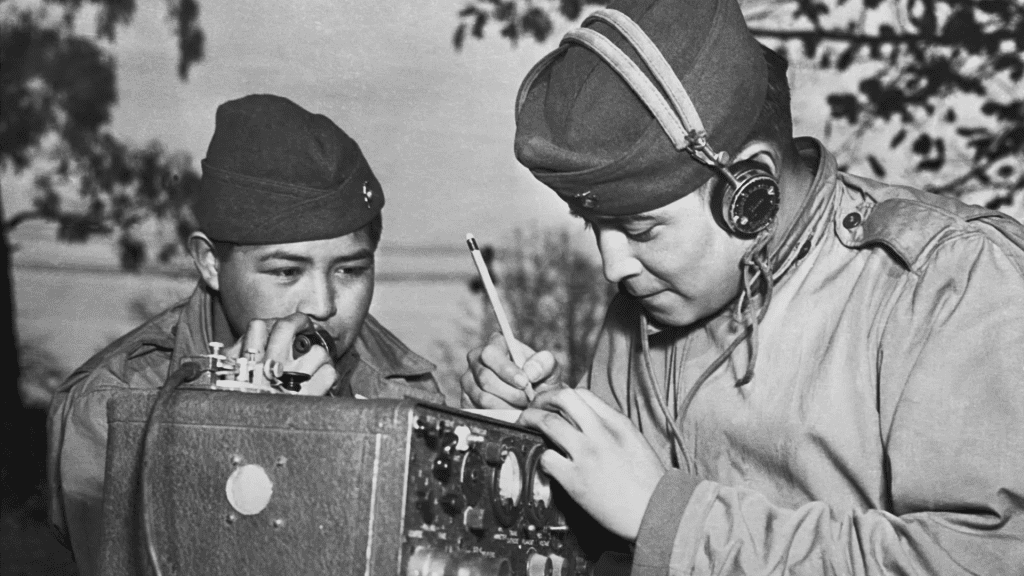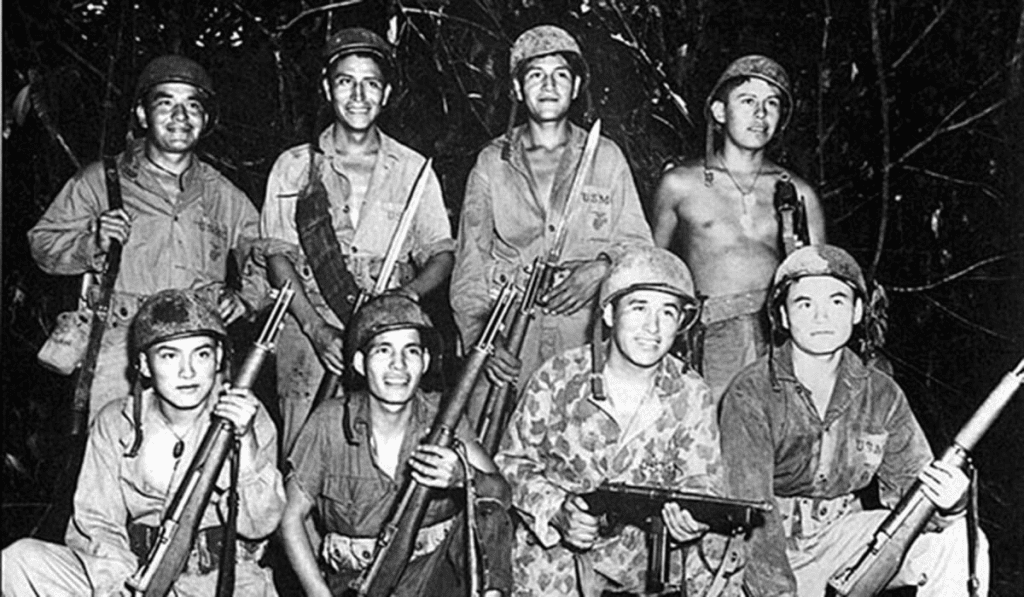During World War II, as Allied forces struggled to maintain secure lines of communication, one of the most powerful weapons in the American military wasn’t a machine or a strategy it was a language. A language that confounded the enemy, carried battlefield orders, and saved countless lives. That language belonged to the Navajo Nation, and it was wielded by a group of heroes known as the Navajo Code Talkers.
To outsiders, the words sounded like gibberish. But to the Marines on the ground, these voices were a lifeline. Fast, unbreakable, and reliable, the code created by these Native American servicemen became one of the most effective tools in America’s wartime arsenal. And it was never broken.

The Birth of an Unbreakable Code
The idea of using Indigenous languages as military code wasn’t entirely new, but it was the Navajo language that proved most effective. In 1942, shortly after the attack on Pearl Harbor, the U.S. military approached a group of Navajo men with a unique and urgent request: develop a secure code based on your language that could be used in combat.

The Navajo language was ideal for several reasons. It was unwritten, incredibly complex, and virtually unknown outside the Navajo community. Only a few non-Navajo people could speak it fluently, making it nearly impossible for Axis forces to decipher.
Twenty-nine Navajo men answered the call. They became the original Code Talkers, building a military code from scratch, assigning Navajo words to represent key military terms and concepts. For instance, the Navajo word for “turtle” represented a tank, while “iron fish” was used for a submarine.
Video:
An Unbreakable Code
Code in Combat: Fast, Accurate, and Life-Saving
Once the code was developed and tested, it was deployed across the Pacific Theater. Code Talkers were assigned to Marine divisions and took part in some of the bloodiest battles of the war, including Iwo Jima, Guadalcanal, and Saipan.
Their work was not only brave it was revolutionary. While standard encryption machines could take hours to decode a message, a Code Talker could transmit and translate messages in seconds, allowing for rapid responses on the battlefield.
The code was so effective that, during the Battle of Iwo Jima, Major Howard Connor, a signal officer with the Marines, stated, “Were it not for the Navajos, the Marines would never have taken Iwo Jima.”

The Risk and Sacrifice Behind the Code
The Code Talkers didn’t just carry radios and microphones. They carried the weight of tradition, culture, and secrecy. They were targets, often operating on the front lines. If captured, they faced brutal interrogation or death. Some were even mistaken for enemy troops by fellow Americans because of their appearance and were nearly shot.
Despite these risks, they never faltered. Their loyalty, precision, and courage helped turn the tide of war. Yet for decades, their contributions remained unrecognized, hidden behind layers of military secrecy.

Legacy Beyond the Battlefield
The code was classified until 1968, meaning the heroic efforts of the Navajo Code Talkers were kept secret for more than 20 years. When the truth finally emerged, it stunned the nation. Here were men who had used their ancestral language a language once suppressed and forbidden in schools to defend the country that had marginalized their people.
Video:
Navajo Code Talkers | Short Documentary | EXPLORE MODE
It was a powerful reversal of history. The very language that had been treated as a barrier was now being honored as a key to victory.
In 2001, President George W. Bush awarded the original 29 Code Talkers the Congressional Gold Medal, and silver medals to the hundreds of others who served afterward. Monuments, documentaries, and memorials followed, ensuring that their story would never be forgotten again.
More Than Words: A Cultural Triumph
The code was never broken, not once. That is not just a technical victory it is a cultural one. The Navajo language, passed down through generations, became a shield for thousands of American soldiers. It was not just a code. It was a legacy, woven from history, pride, and survival.
Today, the story of the Navajo Code Talkers serves as a reminder that strength can come from the most unexpected places. In a time when silence or erasure often followed Native American contributions, these warriors made their voices heard in a way that changed the course of history.

Conclusion: Honoring the Unbreakable Voices
The Navajo Code Talkers are not just war heroes they are cultural heroes. Their service is a testament to how deeply language, identity, and patriotism can be intertwined. In the face of war, they chose to use their heritage to save lives and shape victory.
Their code may have been a mystery to the enemy, but its message to the world is crystal clear: honor, courage, and culture matter and they endure long after the war is over.


